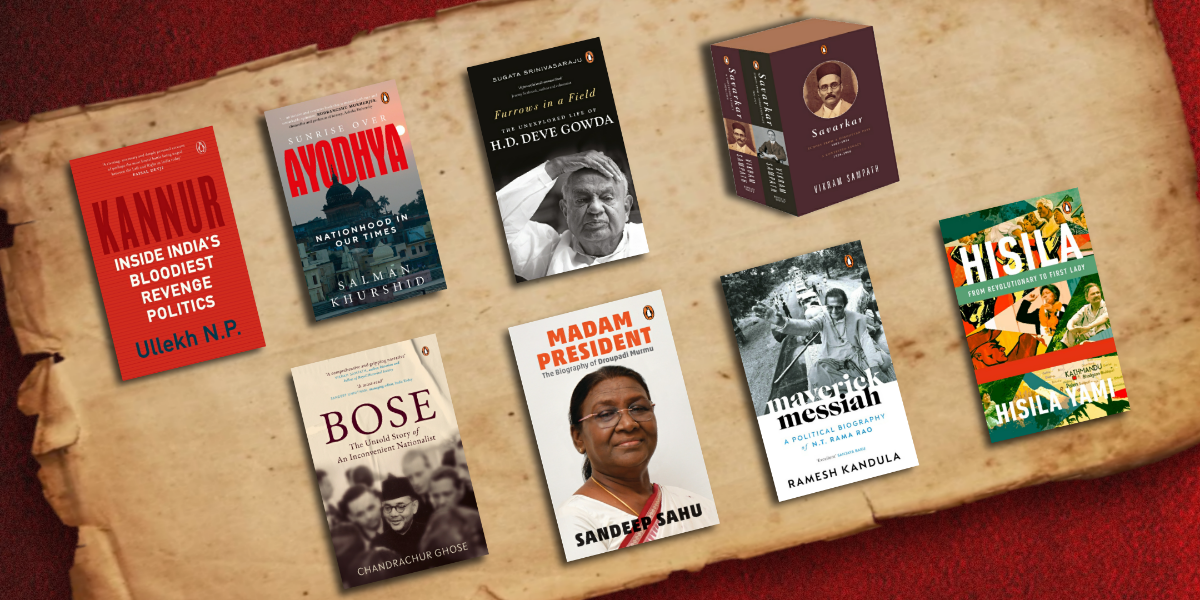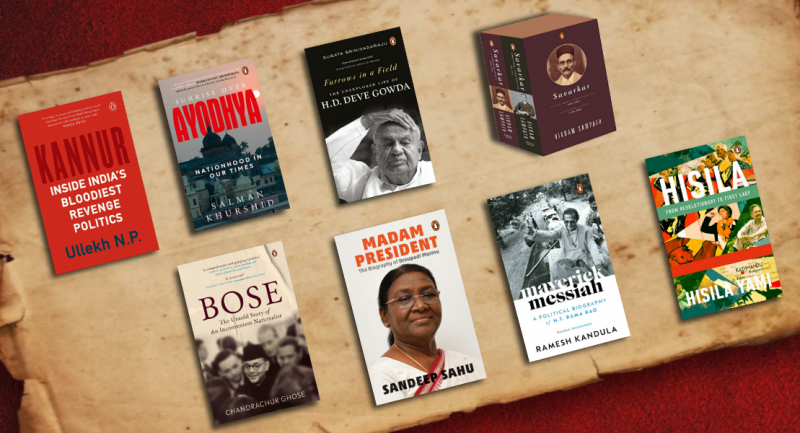
Step into the revolutionary world of political biographies, where we uncover the personal stories and untold struggles behind the influential figures who shaped our history. From the halls of power to the battlegrounds of rebellion and change, journey alongside these 8 trailblazers in Indian Politics whose stories continue to inspire and provoke thoughtful reflection.

Madam President is the first-ever comprehensive and authentic biography of Droupadi Murmu, the fifteenth President of India, by senior journalist Sandeep Sahu. Murmu’s long and eventful political journey is a story of true perseverance and inspiration. Having battled early years of struggle in securing quality education, being struck by a series of personal tragedies such as the loss of her husband and two sons in quick succession,
and suffering electoral victories and losses, Murmu has risen through her circumstances with grace, fortitude and resilience that make her the well-revered leader she is today.

Nandamuri Taraka Rama Rao, widely known as NTR, was not merely a film star who strayed into politics and captured power in Andhra Pradesh. The actor-politician redefined the political culture in the state and scripted a new political idiom.
His rather dramatic entry into politics, the profound impact he left on the people of Andhra Pradesh and the vital role he played in national politics during his relatively short political life, however, have not received deserving recognition.
Maverick Messiah captures the different facets of NTR’s life in all their varied hues and puts in perspective the significant contribution of the actor-politician to the Indian political tapestry.

Born in Kannur and brought up amidst some of the tallest political leaders of the state, author Ullekh N.P. delves into his personal experiences while drawing a modern-day graph that charts out the reasons, motivations and the local lore behind the turmoil. He analyses the numbers that lay bare the truth behind the hype, studies the area’s political and cultural heritage, and speaks to the main protagonists and victims. With his journalistic skills and years of on-the-field reporting, he paints a gripping narrative of the ongoing bloodbath and the perceptions around it.
Ullekh’s investigations and interviews reveal a bigger game at work involving players who will stop at nothing to win.

On 9 November 2019, the Supreme Court, in a unanimous verdict, cleared the way for the construction of a Ram temple at the disputed site in Ayodhya.
As we look back, we will be able to see how much we have lost over Ayodhya through the years of conflict. If the loss of a mosque is preservation of faith, if the establishment of a temple is emancipation of faith, we can all join together in celebrating faith in the Constitution. Sometimes, a step back to accommodate is several steps forward towards our common destiny.
Through Sunrise Over Ayodhya, Salman Khurshid explores how the greatest opportunity that the judgment offers is a reaffirmation of India as a secular society.

Was Bose really a Nazi sympathiser? Knowing very well about the strong public opinion that existed among the political leadership and the intelligentsia in India against Nazi Germany, Fascist Italy, and imperial Japan, why did he risk his own political image by allying with the Axis powers?
Pacey, thought-provoking and absolutely unputdownable, Bose: The Untold Story of an Inconvenient Nationalist will open a window to many hitherto untold and unknown stories of Netaji Subhas Chandra Bose.
Probably the first critical biography of Netaji Subhas Chandra Bose till date.

This two-volume biography series, exploring a vast range of original archival documents from across India and outside it, in English and several Indian languages, historian Vikram Sampath brings to light the life and works of Vinayak Damodar Savarkar, one of the most contentious political thinkers and leaders of the twentieth century.
Comprehensive, definitive and absolutely unputdownable, this two-volume biography opens a window to previously unknown untold life of Vinayak Damodar Savarkar.

Furrows in a field narrative is instructed by Gowda’s rich parliamentary record, archival material and interviews conducted with people associated with him at various stages of his life. The layered narrative is further nuanced by Gowda’s own voice, gargantuan memory, a close reading of the time when he made history and the currents of destiny that preceded it. Although Gowda has spent most of his years in Karnataka and has become a symbol of the federal idea, this book argues that the diverse national imagination and sincerity that he deployed as prime minister had magically lit up different corners of India.

In this fascinating book, Hisila Yami traces her journey from being a young Nepali student of architecture in Delhi in the early eighties to becoming a Maoist revolutionary engaging in guerrilla warfare in Nepal. Yami was one of the two women leaders who were a part of the politburo of the Communist Party of Nepal (Maoist), which led the People’s War in the country that changed the course of its history forever.









